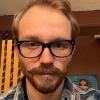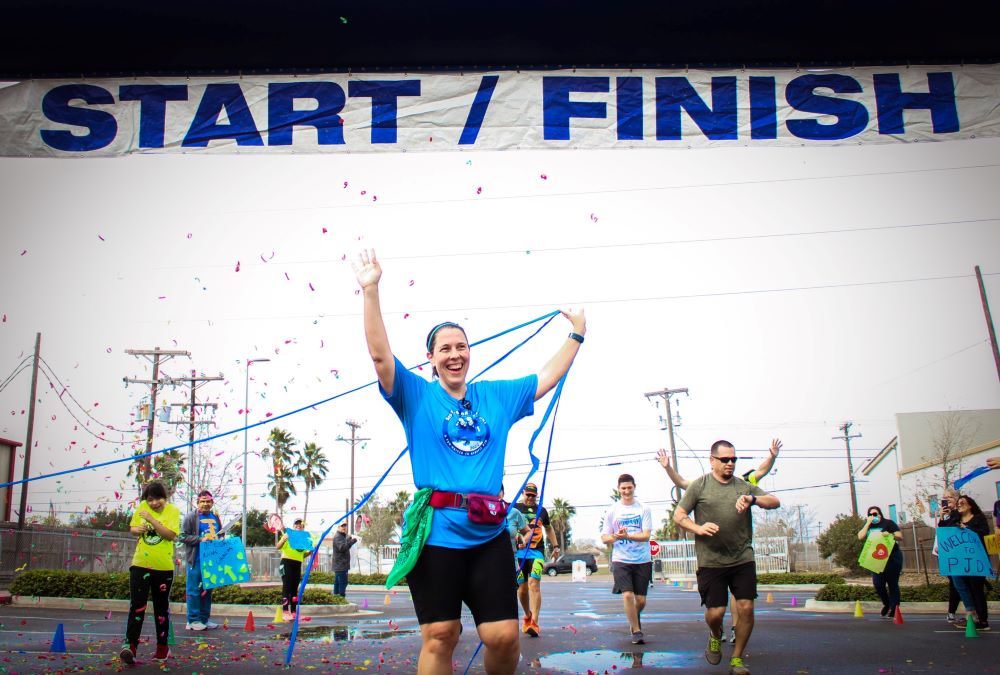
Daughter of Charity Sr. Elizabeth Sjobert crosses the finish line at the Sisters on the Run marathon on Jan. 28, 2023. She founded Sisters on the Run, which raises money for Proyecto Juan Diego, a mission serving low-income Hispanic families in Brownsville, Texas. This year's run is Jan. 27. (Courtesy of Proyecto Juan Diego)
Sr. Elizabeth Sjoberg, a 16-year veteran of the Daughters of Charity, wasn't an athlete growing up. Speaking to GSR, Sjoberg explains, "I was into sports as a kid, but not in high school — in high school, I was more into singing in the choir and playing piano."
"When I became a Daughter of Charity, I started to get my spiritual life in order, and I thought it would also be a good time to get my physical health and nutrition in order."
This motivation led Sjoberg to start running marathons, slowly at first and culminating in her founding of Sisters on the Run. What began as a desire to get healthy became a powerful tool to raise awareness and funds for Proyecto Juan Diego, a mission serving low-income Hispanic families in Brownsville, Texas.
To date, Sisters on the Run has raised more than $55,000 for Proyecto Juan Diego. This money has contributed to empowering and supporting local families with programs that include health and wellness services, translation, immigration assistance, GED and ESL classes and more.
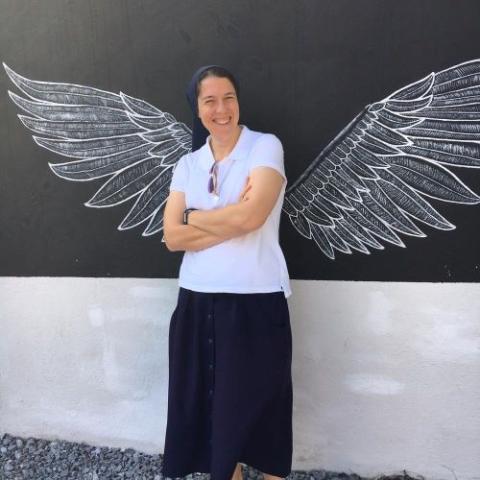
Sr. Liz Sjoberg poses in Matamoros, Mexico. (Courtesy of Proyecto Juan Diego)
Sjoberg and the Sisters on the Run volunteers run their next marathon on Jan. 27 with a goal of raising $25,000 for Proyecto Juan Diego and its mission.
GSR: What motivated you to start running marathons to raise money for Proyecto Juan Diego?
Sjoberg: I got into distance running while living in Chicago and studying for a master's in social work. I ran my first half-marathon in Chicago with one of the other sisters. It was neat to have that connection between sister and community, people encouraging you to do something different — something life-giving and active.
After that, I was on a mission in St. Louis for four years. There's a residential facility there called Marygrove. They were recipients of part of the donations from the GO! St. Louis Marathon. That was my first opportunity to run as a part of a team on behalf of a charity. And that's where the idea spawned to run for a cause.
When I got missioned down to Texas five and a half years ago, it was something that I thought of almost on a whim. Like, let me run this half marathon and do a Facebook fundraiser to see what kind of response I get and if people are interested in supporting our work in this way. And that first half marathon I ran, we raised $4,000 for the agency.
How has Sisters on the Run evolved over the past five years, and what has been the community's response to the fundraiser?
It really grew from there. The next year, I said, "Why don't I run a full marathon?" So, I chose the McAllen Marathon. My family came, and we had staff members at the finish line with their maracas and all the fanfare.
Then COVID hit, and they were canceling all the races. By that point, there was another sister in the house — Sr. Sharon Horace, also a runner. We completely flipped the script and decided to do the marathon ourselves here in Brownsville and end here at Proyecto, with a finish line and party. So, COVID gave us the impetus to do this independently instead of just latching ourselves to an existing event.
We posted on Facebook asking if anyone wanted to run with me, and it was amazing to me that people turned out for it. You know, people from the community. People had signs. There were local runners from running clubs — groups in the area, who just said, "Listen, this sister is going to run; let's run with her." It was an absolutely wonderful, fun race and a great experience. We ended the race in the neighborhood of Cameron Park, one of the primary communities served by Proyecto Juan Diego.
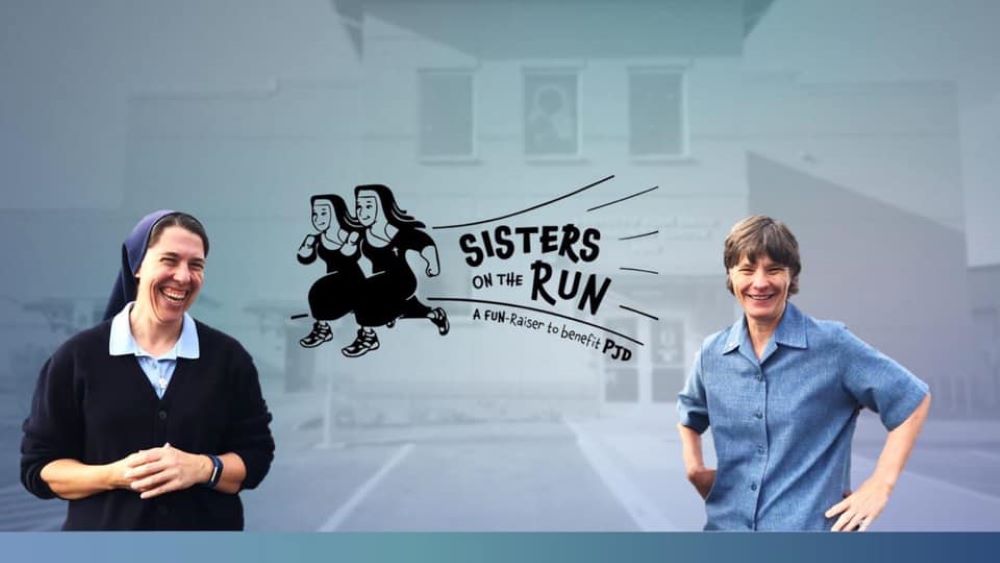
Daughter of Charity Srs. Elizabeth Sjoberg (left) and Sharon Horace were featured on the Proyecto Juan Diego Sisters on the Run 2021 event website page. Sisters on the Run started in 2018 when Sjoberg ran a half-marathon to raise money and awareness for Proyecto Juan Diego.(Courtesy of Proyecto Juan Diego)
Could you share more about the mission of the Daughters of Charity and how it aligns/connects with Proyecto Juan Diego and Sisters on the Run?
Our mission as Daughters of Charity is to serve Christ and the person of the poor in humility, simplicity and charity. So, we try to find and serve Jesus in those around us, especially those in need. Because Proyecto Juan Diego is a sponsored work of the Daughters of Charity, Proyecto's mission very much aligns with the focus and the mission of the Daughters of Charity.
At Proyecto, we serve low-income families who, for whatever reason, are struggling. We have many different programs and services, including immigration, health care, and social services — we have counseling, support groups, anger management, parenting, and financial literacy programs. There are after-school programs where kids can come and do their homework and projects. And, of course, GED and ESL. Those are things we've learned over time that people in the area really do need.
The philosophy of service at Proyecto is about walking with people in accompaniment and empowering them to reach their goals.
Sisters on the Run is essentially a doorway. People say, "I want to run a 5K — let me just sign up for this one." Then, they might want to learn more about our mission, or maybe they want to be a volunteer, tutor a kid or adopt a family for Christmas. We start to see people who can give but don't know how or haven't connected with an agency before. And that's what we're trying to see.
As a Daughter of Charity, service to the poor is a key facet of your mission. How do you perceive this call to service to the poor, and how does it guide your day-to-day work?
After 16 years, you would think that it's pretty well-embedded in my spirit, and it is. But it's also something that you have to work on every day.
Whenever I feel like I'm not doing this very well or could be better, I think of all those sisters who came before me who were faithful Daughters of Charity. It inspires me to get up the next day and do it all over again because there is joy in laying your life down for another. Sometimes, the joy is a little deeper, and you've got to reach for it, and sometimes, the joy is really close to the surface because we've been able to see Jesus and make a difference.
What strategies do you employ to empower Hispanic families in Cameron Park?
For us, empowerment is creating an environment where people can see their strengths and grow. We create a space where people can feel like they've been heard. Then, they often become more open to talking about their issues.
We always try to welcome people and affirm the good things they're doing instead of pouncing on something we see as a problem.
I think people respond better to a strength-based perspective than a medical model where it is like, "Here's what's broken, so let's fix it." It's about understanding your situation and discussing your abilities, skills and competencies. Then, we see what we can do to help you, walk with you and grow with you.
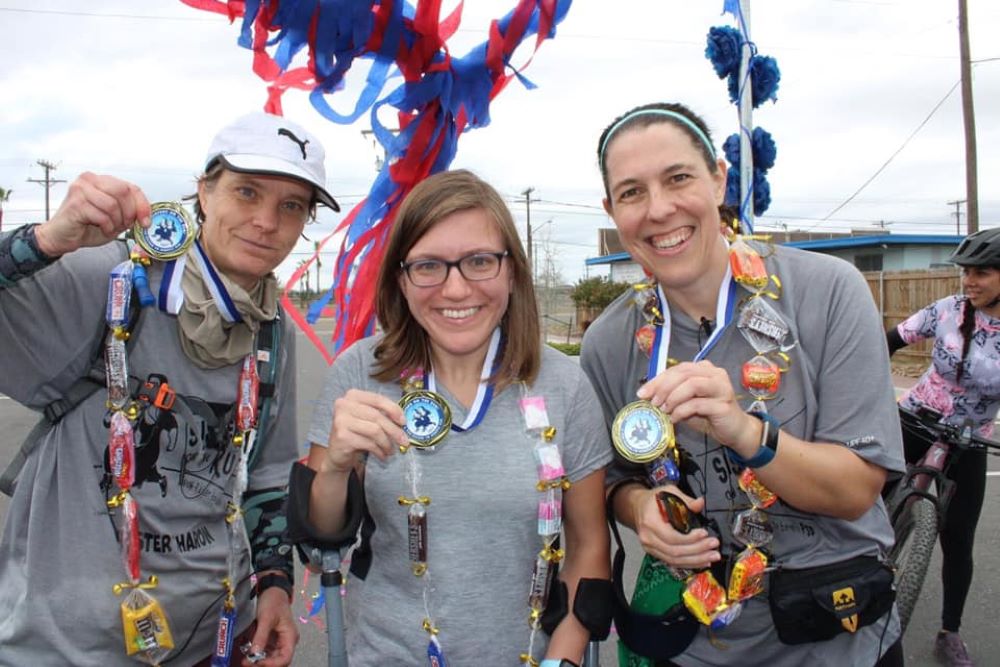
Showing off their medals at the end of the 2021 Sisters on the Run fundraiser are, from left, Sr. Sharon Horace, Alex Vizard and Sr. Liz Sjoberg. (Courtesy of Proyecto Juan Diego)
What are some of the specific challenges you've encountered working with low-income Spanish-speaking families in Texas, and how do you and your community overcome these challenges?
One of the biggest challenges is trauma. People carry that trauma, and it impacts their relationships, their parenting and their kids.
Poverty is also a big challenge and a barrier for people. Often, it's the fact that undocumented people can't legally work — it's not that they don't want to work, but it's hard to stay under the radar and provide for their families — and so that can be a big issue.
Then, there are lots of things related to poverty. There's a lack of education, an inability to pay the bills, or a choice between medications and paying the light bill.
Sometimes, it makes us feel powerless that we can't do more. But we also realize that we can do something. There's peace in knowing that we're doing what we can. But there has to be some peace or detachment in the sense that we can't do everything.
We have to know that God is in control and that we prioritize doing the things that we can do and find others to fill in the gaps for the things we can't do. I suppose that's the body of Christ. We have to work together because not everybody can do everything. I think we can sleep well at night knowing that we've done something and that we've done the best we can with what we have.
Advertisement
How do you measure your success in the work you do?
We do many assessments with our participants. On the health side, we do physical examinations like measuring blood pressure, A1C, blood sugar, height, weight and waist circumference. On the mental health side, we do assessments depending on the client's needs. Some assessments revolve around depression and anxiety. We do assessments for isolation and loneliness for our elders. It's the same thing with the kids — we do behavior assessments with our kids in the after-school program.
Another compelling way we track our success is through testimonials and experiences of the people. When someone comes in the door and tells us their cousin or neighbor told them to come, or their friend said that we help people, that speaks volumes to me about the work we're doing and that the people are saying that Proyecto is a place that helps people.
